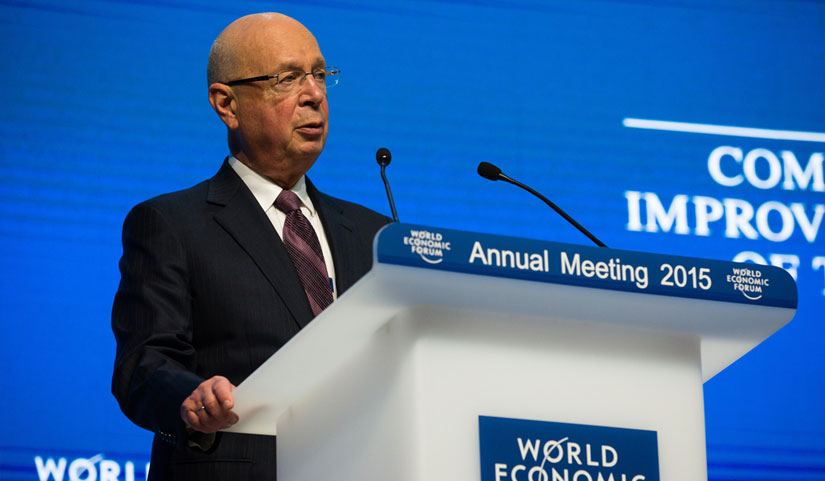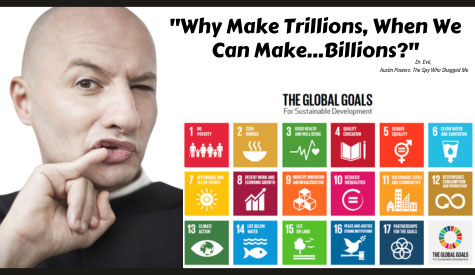WEF’s Not-So-Secret Plans for World Domination

The World Economic Forum wasn’t on the radar for most people until the Covid pandemic. Now personalities like Klaus Schwab, founder and executive chairman of the WEF, are the subject of comical memes signifying the global elite's plan to rule the world. Whether you like it or not, what the WEF does affects your everyday life. Here’s five things you should know.
Controlling Politicians and Key Business Leaders
Schwab founded the WEF in 1971 as a global alliance of political world leaders and diplomats and nonprofit special interest groups with one goal in mind—to assert global control by influencing key business leaders, politicians, activists, journalists and influencers. These elites annually gather in Davos, Switzerland to set their agenda. Early on the WEF realized it needed a way to influence elected officials and policy decision makers. So, in 2004, WEF created its Young Global Leaders Program, to recruit and train young leaders. So far hundreds have “graduated” from the program. Just search the WEF’s website and Young Global Leaders. Left-leaning politicians such as Canadian Prime Minister Justin Trudeau and New Zealand Prime Minister Jacinda Ardern are just two that come to mind. But the program is affecting many levels of government. In 2017, The Financial Post reported that Schwab admitted he was very proud that the WEF was “penetrat[ing]” governments with Young Global Leaders, adding that as of 2017 “more than half” of Canadian Prime Minister Justin Trudeau’s Cabinet had been members of the program. Here's the unedited YouTube video here: If you want to know if your local, state or national elected official or a company CEO is part of the WEF Club, visit its website and simply search their names. (Note, not everyone whose name appears on the WEF’s site is a pawn, but it’s worth watching their actions.)
 WEF Wants to Control the Future
WEF Wants to Control the Future
In his opening remarks at the 2022 Davos conference, Schwab made the WEF’s plans clear: “The future is not just happening. The future is built by us, by a powerful community as you here in this room. We have the means to improve the state of the world. But two conditions are necessary. The first one is that we act all as stakeholders of larger communities, that we serve not only self-interest, but we serve the community. That’s what we call stakeholder responsibility. And second, that we collaborate.” In his book the “Great Reset,” Schwab wrote how the Covid pandemic was “a rare but narrow window of opportunity to reflect, reimagine, and reset our world."
The Great Reset and the ESG Agenda
The Great Reset has three main goals: more equitable economies worldwide (think socialism/Marxism); global investments aimed at equality and sustainability (think the LGBT+ quotas at Fortune 500 companies and the Green New Deal); and using “innovations from the Fourth Industrial Revolution” to push the common good, particularly addressing social and health challenges (think vaccine mandates and digital health passports).
The WEF has set 17 goals it says it would like to achieve by 2030. They range from achieving zero poverty and hunger, to reducing inequalities, promoting sustainable cities and communities, responsible consumption and production, climate, and justice. These boil down to what is commonly known as environmental, social governance or ESG. The WEF partners with banks, insurance companies and investment companies, such as investment giant BlackRock to push through ESG standards and rate companies based on how well they adhere to these subjective, socially conscious scores.
Notice that the WEF’s goals are devoid of personal freedoms? Meat lovers beware: the WEF is regularly pumping out stories such as “5 Reasons Why Eating Insects Could Reduce Climate Change”. Like a gas-powered car? The WEF thinks it’s only a matter of time before it takes that away, evidenced by this story celebrating the “EU’s 2035 ban on sales of gas-powered cars”. It answers its own question, “Are Covid-19 vaccine mandates human rights violations?" with its subhead “Probably not, experts say, because everyone has a fundamental right to be protected from the spread of the disease.” The WEF also works in lockstep with the World Health Organization and the United Nations to push through these policies.
Say Hello to Digital Currency and Social Credit Scores
Many people argue that the pandemic happened to usher in a new age of digital currency and the WEF’s actions don’t do much to disprove this theory. For over a decade, WEF has been busy shaping digital currency regulations from around the world. The WEF’s Digital Currency Digital Currency Governance Consortium is made up of 80 organizations from around the world and is already in phase two of work to “shape the trajectory of digital currency development.”
According to the Atlantic Council, a U.S.-based researcher, 130 countries are exploring digital currencies. Reuters reports that India and Brazil are on track to launch digital currencies in 2024. While the U.S. is busy exploring a digital dollar and the White House has issued an executive order about it, the Federal Reserve has kicked the decision back to Congress. The Federal Reserve on its FAQ page reassures Americans that their money will be protected and will supplement, not replace hard currency.
There are many reasons behind the push for the digital currency, but one the WEF is already openly exploring is that it would allow banks to tie a person’s digital funds to a social credit score to control consumer behavior. Skeptics worry that globalists plan to adopt China’s social credit score hardline approach, where citizens who are deemed untrustworthy risk having their Internet speeds slowed to a crawl or banned from flying or other public transportation. It’s not limited to China. Swedish fintech company Doconomy has issued the world’s first credit card that tracks purchases by their carbon emissions If card members surpass their monthly limit, their card gets blocked for the rest of the month.
15-Minute Cities
In the WEF’s utopian future, citizens have all their needs within a 15-mile radius. You can walk everywhere. You don’t have to ever leave. A quick search on the WEF’s website pulls up 202 stories/white papers extolling the virtues of these cities with headlines such as “the Surprising Stickiness of the 15-Minute City” or how these cities fit neatly in the future’s vision for sustainable development. It’s been tried many places around the world including in parts of Paris, Melbourne, England and Canada. China was among the first to try the concept, which it rolled out in autocratic style, with the city boundaries appearing more like prison fences than quaint boundaries. While the concept might strike some as idyllic, controlling where people live and if/how/when they’re able to come and go is simply unrealistic, especially in America. Luckily, the media is throwing some cold water on the concept. This Bloomberg Story highlights that it might not just go over well in America and could “exacerbate inequality.”
So as we venture about in this increasingly “Brave New World,” the important thing to know is to keep a close eye on the WEF and those under its influence. Its authoritarian goals can only be achieved at the expense of your personal liberties.
Categories
Archives
- May 2024 (1)
- April 2024 (7)
- March 2024 (8)
- February 2024 (10)
- January 2024 (8)
- December 2023 (7)
- November 2023 (9)
- October 2023 (7)
- September 2023 (6)
- August 2023 (11)
- July 2023 (9)
- June 2023 (8)
- May 2023 (7)
- April 2023 (5)
- March 2023 (8)
- February 2023 (5)
- January 2023 (5)
- December 2022 (7)
- November 2022 (8)
- October 2022 (3)